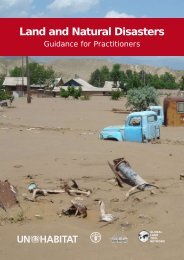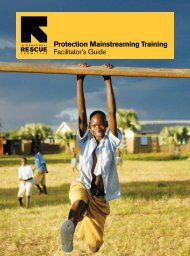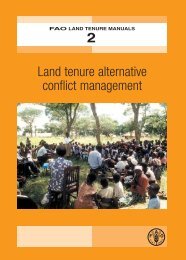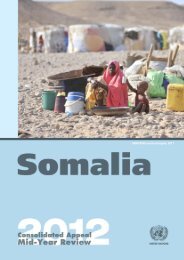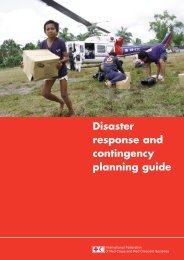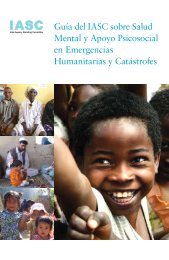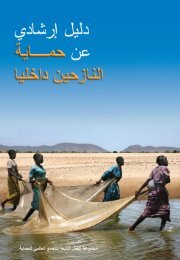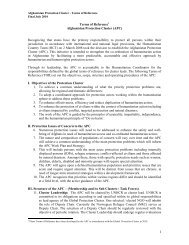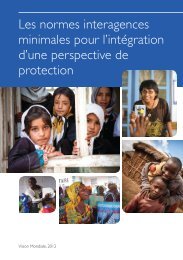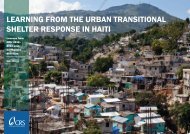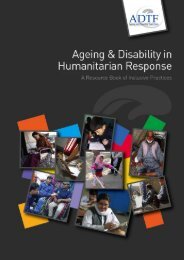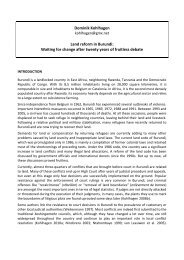Inter-Agency Real Time Evaluation of the Response to Cyclone Nargis
Inter-Agency Real Time Evaluation of the Response to Cyclone Nargis
Inter-Agency Real Time Evaluation of the Response to Cyclone Nargis
You also want an ePaper? Increase the reach of your titles
YUMPU automatically turns print PDFs into web optimized ePapers that Google loves.
Many local organizations, particularly those formed spontaneously for <strong>the</strong> cyclone response, andprivate sec<strong>to</strong>r companies, have realized that providing relief assistance by itself is not enough. Theyare now looking at ways <strong>to</strong> move past relief and engage in longer-term recovery activities.As described in <strong>the</strong> Clusters section, planning and implementation <strong>of</strong> livelihood related activitieswas seen <strong>to</strong> be hampered by <strong>the</strong> fragmented nature <strong>of</strong> livelihood coordination in different clustersand working groups The Periodic Review and PONREPP processes appear <strong>to</strong> <strong>of</strong>fer <strong>the</strong> prospect <strong>of</strong> amore coherent approach <strong>to</strong> livelihoods.3.14.1 Livelihoods RecommendationsR.16. Recovery <strong>of</strong> livelihoods, along with DRR, should be a <strong>to</strong>p priority over <strong>the</strong> coming monthsand <strong>the</strong> HC should oversee a process <strong>of</strong> consolidation, reprioritization and streng<strong>the</strong>ning <strong>of</strong>supporting moni<strong>to</strong>ring and accountability systems as follows:Consolidate <strong>the</strong> current fragmented planning and discussions taking place in variousclusters and working groups. A suitable starting point may be <strong>to</strong> define <strong>the</strong> desiredoutcomes <strong>of</strong> <strong>the</strong> PONREPP from a community perspective as a point <strong>of</strong> reference andwork backwards <strong>to</strong> help decide which groups should continue and which should bephased out;Reprioritize use <strong>of</strong> capacities. For example, UNDP should phase-out <strong>the</strong>ir reliefdistributions as soon as possible and focus <strong>the</strong>ir efforts on coordinating DRR andearly recovery efforts. NGOs who are continuing relief food and NFI distributionsshould ensure that <strong>the</strong>y are not monopolizing resources that would be better utilizedpromoting livelihood recovery and DRR; andSupport <strong>the</strong>se efforts with consultations, outcome-oriented moni<strong>to</strong>ring andaccountability systems, and a robust two-way communication strategy that is targetedat communities and local ac<strong>to</strong>rs in <strong>the</strong> Delta.4 ConclusionsDespite initial fears during <strong>the</strong> beginning <strong>of</strong> May <strong>of</strong> an extended humanitarian crisis within <strong>the</strong>international community, much has been accomplished in responding <strong>to</strong> <strong>Cyclone</strong> <strong>Nargis</strong> by bothnational and international agencies when measuring in terms <strong>of</strong> humanitarian indica<strong>to</strong>rs such asmortality and morbidity rates and coverage <strong>of</strong> assistance. As most relief activities are phasing down,this IA RTE has identified <strong>the</strong> two key remaining relief needs as water during <strong>the</strong> dry season andpsychosocial support for communities through improving DRR and preparedness accompanied bymore systematic consultations. The current focus on transitioning <strong>to</strong> recovery activities needs <strong>to</strong>have a particular focus on res<strong>to</strong>ration <strong>of</strong> livelihoods while significantly streng<strong>the</strong>ning consultationwith and accountability <strong>to</strong> communities.As <strong>the</strong> response has largely being implemented by national staff or through national partners andcapacity building efforts are needed, particularly at <strong>the</strong> <strong>to</strong>wnship level. National staff from bothinternational and national agencies have by and large demonstrated an impressive eagerness andability <strong>to</strong> learn and international agencies thus need <strong>to</strong> ensure that staff entrusted with capacitybuilding have <strong>the</strong> necessary skill sets <strong>to</strong> support <strong>the</strong> recovery process.<strong>Cyclone</strong> <strong>Nargis</strong> left a human tragedy in its wake, but this has been transformed in<strong>to</strong> renewed hope assurvivors recover, thanks in no small part <strong>to</strong> a huge humanitarian effort by <strong>the</strong>ir compatriots, alongwith significant support from international ac<strong>to</strong>rs. A number <strong>of</strong> valuable lessons have been learned29



